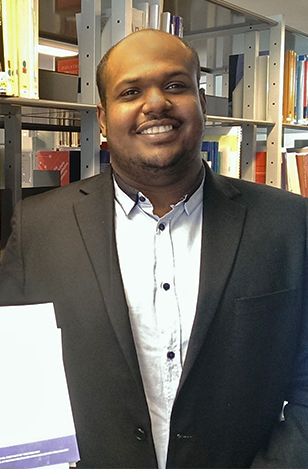Congratulations to your graduation Doctor Mohamed Hamid
CONGRATULATIONS ON YOUR GRADUATION
Mohamed Hamid from Sudan came to Sweden for master studies in 2007. Three years later he got a PhD position at KTH School of Information and Communication Technology and now he has defended his PhD thesis "On Spectrum Sensing for Secondary Operation in Licensed Spectrum".

Where are you from and where did you study before coming to KTH?
– I am from Sudan. I received my B.Sc. in Electrical Engineering from University of Khartoum, Sudan in 2005. In 2007 I was admitted to a Master program in Electrical Engineering-Radio Communications at BTH, Blekinge Institute of Technology, Karskrona, Sweden and graduated in 2009. In 2010 I started my PhD studies at KTH School of ICT, Department of Communication Systems.
What is your topic and why did you choose it?
– Throughput my PhD studies, I have been working on aspects related to facilitating secondary or opportunistic operation in licensed spectrum. As we are all witnessing, smartphones, tablets and other wireless hand-held devices are becoming deeply rooted in our today's daily life. This in return has resulted in a huge amount of data that needed to be transferred wirelessly. In that regard, we do need to efficiently utilize our resources in terms of the radio spectrum. Therefore, opportunistic access to the radio spectrum sounds promising technology to adopt our future wireless systems. In a wider sense, I have chosen this topic because it considers a key challenge faced by the next generation wireless systems, that is, providing enormously high mobile data rates.
Describe your topic in short.
– Traditionally the radio spectrum has been exclusively licensed to specific users by regulation bodies. However many empirical studies have shown that there are substantial unused radio resources in both time and space domains. Therefore, adopting a new radio spectrum regulatory framework that allows opportunistic access of the unutilized radio spectrum would increase the efficiency of our usage of the radio resources. My Phd thesis theme is ''sensing the spectrum to find the free portion of it and then utilizing it as optimally as possible ''.
Tell us something about your results.
– I have managed to develop two novel spectrum sensing techniques and publish their theoretical aspects and findings in highly reputed Journals. Furthermore, I have investigated how different parameters can be set for different techniques to enhance the sensing reliability and the radio spectrum utilization. In addition to, I have proposed a secondary channel access framework for the small scale cellular indoor access points known as femto-cells. This framework is based on spectrum sensing and real-life measurements for the LTE traffic in Kista. With this framework, the network throughput is maximized using the same spectrum assigned for the network operator.
What will the future bring for your research topic?
– We are now approaching towards the fifth generation mobile networks,''5G'' where as high data rates as we could imagine is a need and a key challenge. Hence, many technologies need to collaborate to reach this ultimate goal. As a researcher in the field, I have every reason to believe that dynamic spectrum access is one of these technologies.
What are your plans for the future?
– I envision my near future career as a researcher in communication systems as I can explore many ideas that I didn't have time for during my PhD study and I believe that there is a room for that in the Swedish academia and industry, so I set my near future plan to stay in Sweden and continue doing research.
You can find the PhD thesis by Mohamed Hamid here .

